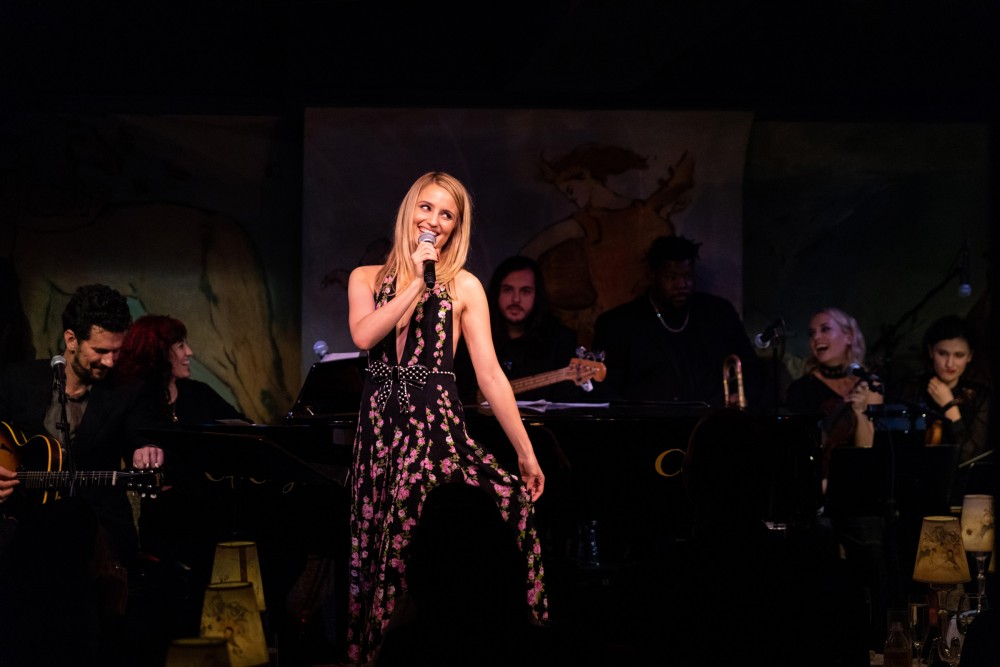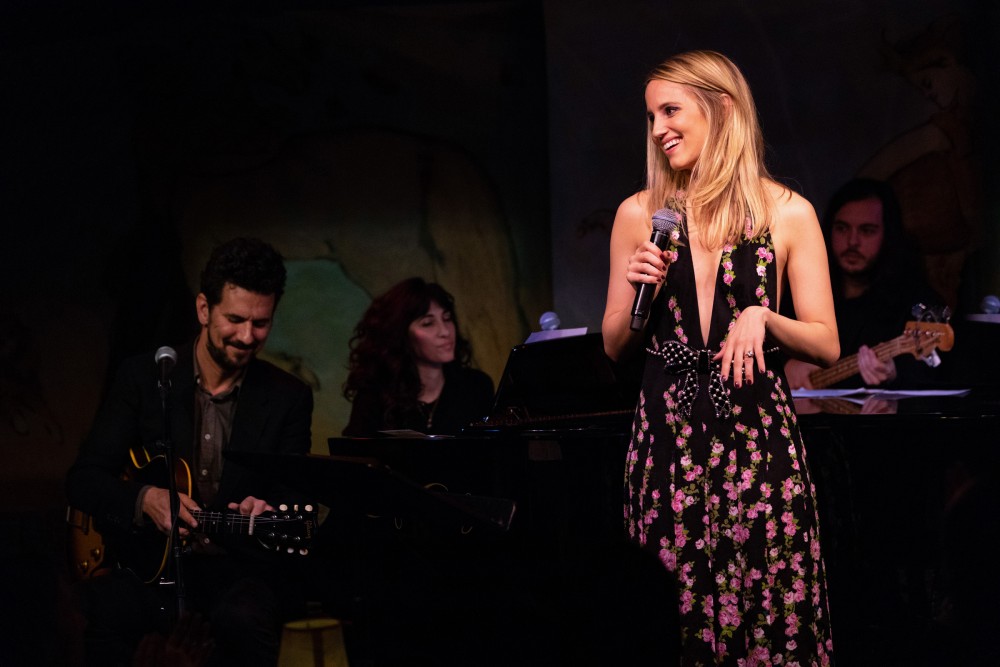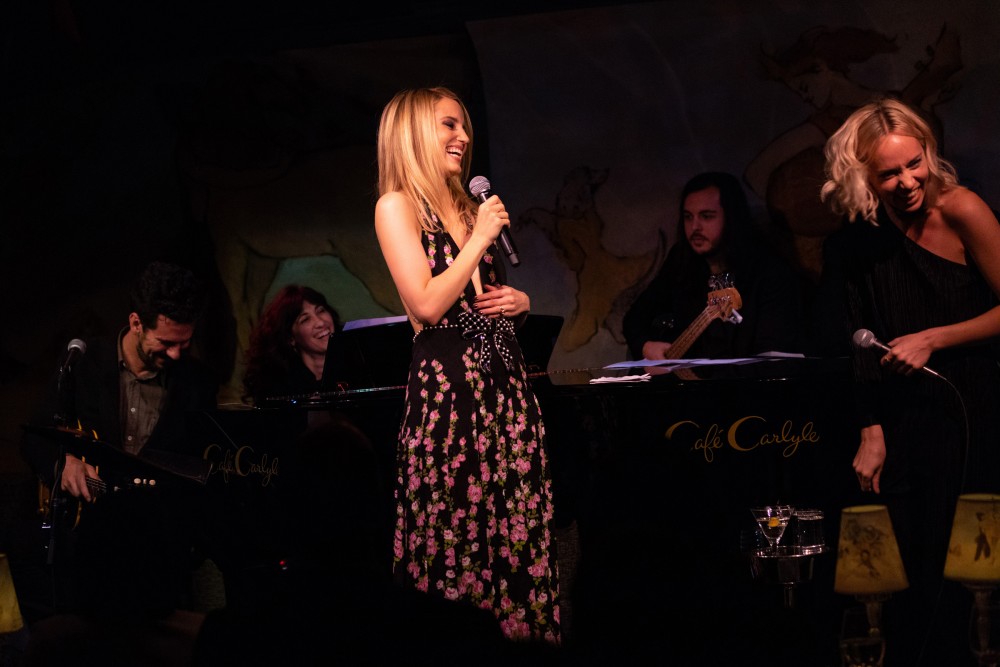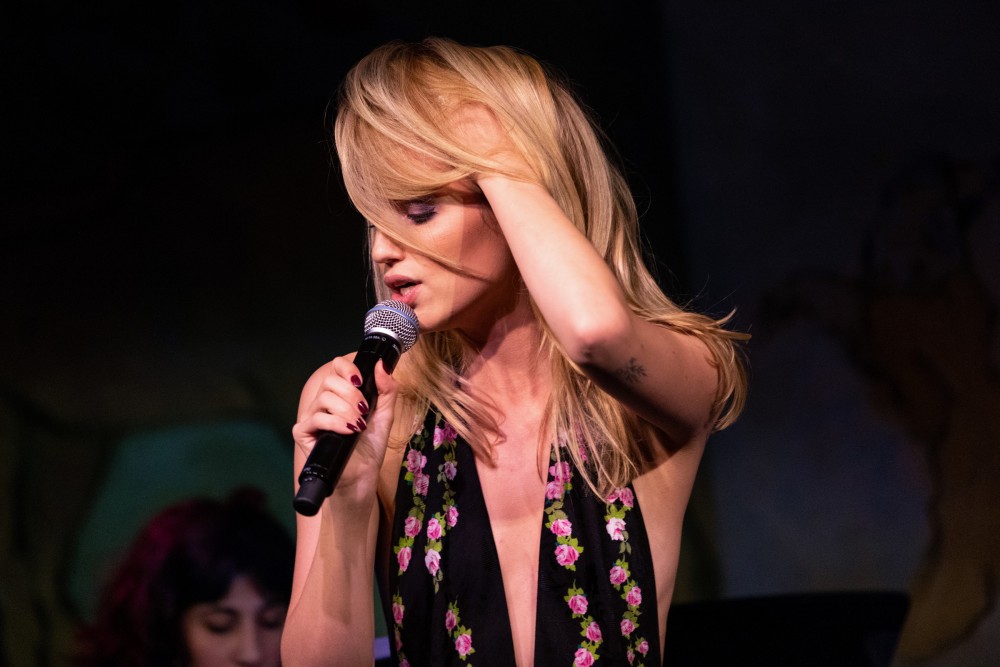
by Matt Smith
Dianna Agron knows a thing or two about curveballs. Throughout her six-season stint on popular musical dramedy series Glee, her character, spiteful cheerleader Quinn Fabray, famously coped with an unplanned teen pregnancy, entered a rebellious phase and donned devilish pink hair, and—perhaps most shockingly—barely skirted death after a run-in with a cargo truck as a result of texting while driving.
So, while she’s not attempting anything as drastic as these experiences of her beloved character, it might come as no surprise—given this mentality—that in her new sultry, self-titled evening of song, which brings her back to the Café Carlyle through February 2, she’s, once again, shaking things up.
This time she’s flipping the script with an evening saluting the female singers of a bygone era. Setting us back almost 60 years, while spanning the old-fashioned catalogues of both immediately-recognizable and less familiar names, from Nancy Sinatra, Peggy Lee and Doris Day to Nico and the Velvet Underground, the evening presents a much different sound than the contemporary pop-rock we’ve heard from her on the aforementioned FOX phenomenon.
In short, though she may have established herself on a show primarily meant for tweens, it’s quite clear that this evening is aimed at an older crowd, cleverly—nay, masterfully—allowing her to distance herself from that snarky TV cheerleader, and re-introduce herself as the artist “Dianna.”


Now, that’s all well and good, but as artists are often told: at the end of the day it’s all in the delivery.
On the bright side, she’s in perfectly good voice, her instrument flawlessly fitted to the venue; equal parts soothing and soulful, it makes the already-cozy Café Carlyle feel that much more intimate.
Additionally, there’s the fact that, when she can, Agron giddily (albeit indulgently) shows off her “fun” side, having martinis hand-delivered to the stage, playfully auctioning off guitarist Gil Landry, and engaging the audience in a rousing, end-of-show sing-along. Landry, on that note, should be singled out for the delightfully delicious extra layer he adds to the whole evening. As Agron’s “second banana: and duet partner, his folksy Glen Hansard-esque timbre complements her loving lilt quite well, and his solo effort, Peggy Lee’s “I Wanna Be Seduced,” has a bewitchingly apt reverse effect on the crowd.
On the topic of sound, too, the arrangements are impeccable, thanks in part to her fiery eight-piece band, featuring, among others, Landry, mononymously-named violinist Margot, and—the subject of much folly for the evening—the ever-cheeky trombonist Jeffrey Miller, who infuses each individual number with a distinctly sassy wail all its own. Additional strings and keys round out the orchestra, giving each number a rich, full sound that, again, vertebrates the room in spite of its snugness.
But on the whole, the set list itself lacks a connective throughline—that tissue which links the songs together—that allows you to learn why the artist picked a particular song, the element that makes cabaret performance such a singular, beloved exclusive art form. Instead of regaling us with personal tales of how such-and-such a song has affected her, or how it relates to the greater scope of the set list, she, for the most part, simply bounces from one ‘60s relic to the next, stopping only briefly to ask if “we’re ready for another one,” while explaining that the selection does resonate with her—giving us the what without the why.


Additionally, when she does relay an anecdote—her affinity for the space, her love of musical theatre (and her subsequent championing of its meteoritic rise in popular culture… she is a Glee girl after all), and finding her voice through the magic and mysticism of The Wizard of Oz (the latter of which, while a lovely story in itself, felt like a particularly missed opportunity to segue into Eartha Kitt’s “I Want to Be Evil,” by perhaps feigning to announce the roles she “really” wanted to pursue)—it feels forced, almost out-of-place, and unconnected to the trajectory of the set list, to the point that, in one case, she even acknowledges its misuse. It feels as if she’s second-guessing herself even after she tells the tale, coupled with an inordinate amount of awkward giggling that results from presenting these stories, a factor which can hopefully be chalked up to inevitable first-night jitters. It’s an unfortunate distraction from what could otherwise be—and in fact, what in many other ways actually is—a wholly enjoyable evening.
Still, on the one hand, what she lacks in expression through connective commentary, she wholeheartedly makes up for in expression through these songs. It’s clear she cares about what she sings, and desires to correctly convey that adoration to her audience. And, on the other, in doing it in the way she does, in all her giggly glory, it’s, for better or worse, all a glimpse into who she is beyond the screen. She’s just Dianna being Dianna, breaking free from her past and showing us who she really is.
And maybe that’s the point. To her, that’s what these artists did: they broke free from their shells, displayed themselves in a different light, and embraced who they were, flaws and all, in order to channel what they really cared about and promoted their ideas of life and love through song. And that’s, to her, what makes them so revolutionary. Which makes it doubly significant that she’s sharing these songs with us in an attempt to reinvent herself.
She may not be perfect, and she may not be exactly there yet, but she knows what she wants, and she’ll try everything she can to obtain it. She knows what she loves and she’ll stop at nothing to ensure it’s abundantly shared and appreciated, lest it die out unnoticed. And most importantly, she knows who she is, and she unabashedly celebrates it—and invites you to as well.
And that, we can agree, is certainly something to cheer about.
Dianna Agron. Through February 2 at The Café Carlyle (35 East 76th Street, at Madison Avenue) through February 2nd. www.cafecarlylenewyork.com
Photos: David Andrako


















